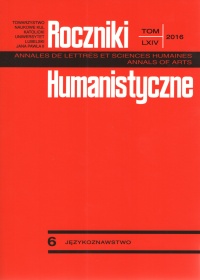Kształtowanie profesjonalizmu tłumacza na studiach translatorskich z perspektywy studentów
Abstrakt
Niniejszy artykuł zawiera analizę odpowiedzi studentów na pytania o to, w jaki sposób oceniają swoje przygotowanie do pracy zawodowej jako specjaliści językowi (tłumacze). W przeprowadzonych z nimi wywiadach mówią też o swojej percepcji nauczycieli przekładu i wpływie, jaki mają oni na zdobywane przez studentów umiejętności. Pytania stawiane studentom w wywiadach dotyczyły także postrzeganych przez nich problemów i trudności związanych z rozwojem umiejętności profesjonalnych tłumacza, a także z funkcjonowaniem na rynku usług tłumaczeniowych. Przeprowadzone badanie pokazują z jednej strony wyraźne zaangażowanie studentów w proces samokształcenia i samorozwoju, z drugiej zaś wskazują obszary, w których oddziaływanie dydaktyczne nauczycieli mogłoby mocniej wspomagać studentów w przechodzeniu do wyższych stadiów rozwojowych w budowaniu tzw. potencjału kariery.
Bibliografia
Arnett J.J.: Emerging Adulthood: What Is It, and What Is It Good For?, „Journal of Society for Research in Child Development” 1(2007), nr 2, s. 68-73.
Bernardini S.: The Theory behind the Practice. Translator Training or Translator Education?, w: Translation in Undergraduate Degree Programmes, red. K. Malmkjaer, Amsterdam–Philadelphia 2004, s. 17-29.
Brammer L.M.: Kontakty służące pomaganiu. Procesy i umiejętności, Warszawa 1984.
EMT Expert Group: Competences for Professional Translators, Experts in Multilingual and Multimedia Communication, Brussels: 2009, www.ec.europa.eu/dgs/ translation/programmes/emt/key_documents/emt_competences_translators_en.pdf [dostęp: 28.06.2015].
Göpferich S.: Towards a Model of Translational Competence and its Acquisition: The Longitudinal Study TransComp, w: Behind the Mind. Methods, Models and Results in Translation Process Research, red. S. Göpferich, A. L. Jakobsen, I. M. Mees Copenhagen 2009, s. 11-37.
González Davies M.: Multiple Voices in the Translation Classroom, Amsterdam–Philadelphia 2004.
González Davies M., Kiraly D.: Translation Pedagogy, w: Encyclopedia of Language and Linguistics, red. K. Brown, Oxford 2006, s. 81-84.
Gouadec D.: Translation as a Profession, Amsterdam–Philadelphia 2007.
Hurtado Albir A.: Competence–based curriculum design for training translators, „The Interpreter and Translator Trainer” 1(2007), nr 2, s. 163-195.
Kearns J.: The Academic and the Vocational in Translator Education, w: Translator and Interpreter Training: Issues, Methods and Debates, red. J. Kearns, London–New York 2008, s. 184-214.
Kiraly D.: A Social Constructivist Approach to Translator Education: Empowerment from Theory to Practice, Manchester 2000.
Kiraly D.: Towards a View of Translator Competence as an Emergent Phenomenon: Thinking Outside the Box(es) in Translator Education, w: New Prospects and Perspectives for Educating Language Mediators, red. D. Kiraly, S. Hansen-Schirra, K. Maksymski, Tübingen 2013, s. 197-223.
Klimkowska K.: Orientacja na sukces zawodowy studentów kończących studia translatorskie, Lublin 2013.
Klimkowska K.: Cognitive Proactivity of Translators-to-be, „Language and Literary Studies of Warsaw” 4(2014), s. 223-237.
Klimkowska K.: Education for success in translation courses as assessed by translators-to-be, w: Challenges of contemporary education – theoretical and empirical contexts, red. A. Dudak, A. Kanios, O. Karpenko, Drohobych 2014, s. 193-204.
Klimkowska K.: Entrepreneurial potential of the students of applied linguistics programme, majoring in translation, „Academic Journal of Modern Philology” 3(2014), s. 18-26.
Klimkowska K., Klimkowski K.: Transgresjonizm J. Kozieleckiego jako propozycja dla kształcenia zawodowego tłumaczy, w: Edukacja ustawiczna dorosłych w europejskiej przestrzeni kształcenia z perspektywy polskich doświadczeń, red. M. Pakuła, A. Dudak, Lublin 2009, s. 259-266.
Klimkowska K., Klimkowski K.: Kształtowanie kompetencji świadczenia usług tłumaczeniowych z perspektywy przyszłych tłumaczy, Lublin 2015.
Klimkowski K.: Towards a Shared Curriculum in Translator and Interpreter Education, Wrocław–Washington D.C. 2015.
Klimkowski K.: Specjalista językowy jako przedsiębiorca, w: Nauczanie języków obcych na potrzeby rynku pracy, red. M. Sowa, M. Mocarz-Kleindienst, U. Czyżewska, Lublin 2015, s. 163-174.
Klimkowski K., Klimkowska K.: Towards Empowerment In Translator Education: Students’ Opinions And Expectations Of The Translation Training Course, w: Global Trends in Translator and Interpreter Training: Mediation and Culture, red. S.E. Hubscher-Davidson, M. Borodo, London–New York 2012, s. 180-197.
Kubinowski D.: Jakościowe badania pedagogiczne. Filozofia – Metodyka – Ewaluacja, Lublin 2010.
Kvale S.: Prowadzenie wywiadów, Warszawa 2011.
Łompieś J.B.: In Pursuit of Business Excellence, „Lingwistyka Stosowana – Przegląd” 13(2015), s. 31-42.
PACTE: Acquiring Translation Competence: Hypotheses and Methodological Problems of a Research Project, w: Investigating Translation: Selected Papers from the 4th International Congress on Translation, Barcelona, 1998, red. A. Beeby, D. Ensinger, M. Presas, Amsterdam–Philadelphia 2000, s. 99-106.
PACTE: Building a Translation Competence Model, w: Triangulating Translation. Perspectives in Process Oriented Research, red. F. Alves, Amsterdam–Philadelphia 2003, s. 43-66.
PACTE: First Results of a Translation Competence Experiment: ‘Knowledge of Translation’ and ‘Efficacy of the Translation Process’, w: Translator and Interpreter Training. Issues, Methods and Debates, red. J. Kearns, London–New York 2008, s. 104-126.
PACTE: First Results of PACTE Group’s Experimental Research on Translation Competence Acquisition: The Acquisition of Declarative Knowledge of Translation, „MonTI Special Issue” 1(2014), s. 85-115.
PL-EN 15038, Polska Norma: Usługi tłumaczeniowe. Wymagania dotyczące świadczenia usług, Warszawa 2006.
Rogers C.R.: Client-centered Therapy. Its Current Practice, Implication and Theory, London, 1951.
Tanner J.L., Arnett J.J.: The Emergence of ‘Emerging Adulthood’, The New Life Stage between Adolescence and Young Adulthood, w: Handbook of Youth and Young Adulthood. New Perspectives and Agendas, red. A. Furlong, London-New York 2009, s. 39-45.
Tanner J.L., Arnett J.J., Leis J.A.: Emerging Adulthood: Learning and Developing during the First Stage of Adulthood, w: Handbook of Research on Adult Development and Learning, red. M.C. Smith, N. DeFrates-Densch, New York–London 2008, s. 34-67.
Copyright (c) 2016 Roczniki Humanistyczne

Utwór dostępny jest na licencji Creative Commons Uznanie autorstwa – Użycie niekomercyjne – Bez utworów zależnych 4.0 Międzynarodowe.





